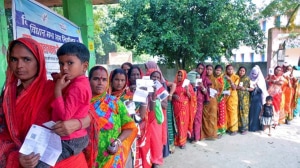With over 50 lakh beneficiaries registering for Covid-19 vaccination since the second phase of the inoculation drive began on Monday, and with overcrowding being reported in several parts of the country, the Centre on Tuesday directed states to utilise all private hospitals, including those that are not empanelled under government health insurance schemes, for the vaccination exercise.
The Centre has also said that hospitals can, in consultation with state governments, extend their vaccination sessions, and that it is not mandatory to limit the session to 5 pm. Besides, states and hospitals have been told “to open the vaccination slots for 15 days to a month”. Currently, beneficiaries applying on the Co-WIN portal can only find slots for a week.

Daily briefing | The stories you need to start your day with
Story continues below this ad
In the first two days of the second phase of the vaccination drive that began Monday — for those above 60 years of age and those above 45 years with associated co-morbidities — around 10,000 private hospitals empanelled under Ayushman Bharat, 600 under the Central Government Health Scheme (CGHS), and State Health Insurance were designated as vaccination centres.
The direction to states to further ramp up coverage and enlist all private hospitals was communicated to states at a high-level meeting on Tuesday chaired by Union Health Secretary Rajesh Bhushan, along with Dr Ram S Sharma, chairman of the Empowered Group on Vaccine Administration.
“Private hospitals not empanelled under the above mentioned three categories have also been permitted to operate as COVID Vaccination Centers (CVCs)… States/UTs can proactively make efforts to use these private hospitals as CVCs,” the Health Ministry said.
States have been directed to ensure that all private hospitals that will operate as vaccination centres must have “an adequate number of vaccinators, adequate space for observation of the vaccinated, adequate cold chain arrangement and adequate arrangement for the management of Adverse Events Following Immunisation”.
Story continues below this ad
On extending the time limit for the sessions, Bhushan, in the weekly briefing earlier in the day, said, “Co-WIN 2.0 doesn’t provide for a 9 am to 5 pm vaccination session. It has done away with the timeline. If the hospital has the capacity, the system permits the hospital to do vaccinations even after 5 pm. They need to do it in consultation with state governments.”
As on Tuesday, 4,34,981 beneficiaries in the two priority groups have received the first dose of the vaccine, the Ministry said.
The Centre said there have been about 50 lakh registrations on the Co-WIN website since Monday. “Now if the average number of beneficiaries per registration is around two, it means as many as one crore people have registered,” Sharma said.
While admitting that people may have faced difficulties while registering on the first two days, he said, “…there could be difficulties, I am not going to deny that. However, 50 lakh persons have registered and every hour, around 2 lakh have been registering. This is good speed. However, if there are any issues, we will resolve them”. “People yesterday had complained about glitches in the system… but what had happened is that people were looking for an app. That app [Co-WIN 2.0] was not meant for this purpose [for beneficiaries to register]. Only Aarogya Setu provides that facility or beneficiaries can register on the website. Of course, we are watching the system for scalability and it should be able to take huge amounts of the load as we will be vaccinating one-sixth of humanity. We also want data to be secure and safe and that the system should be protected from cyber attacks,” he said.
Story continues below this ad
During the weekly briefing, ICMR Chief Dr Balram Bhargava clarified that both Covishield and Covaxin are safe to be administered for those on blood thinners.
“I have said this earlier… the vaccine can be administered on those who are on blood thinners. Those who are having aspirin can continue to have it. Those who are on anti-coagulants have to stop for 1-2 days only because there could be a clot near the injection site. There is no contraindication either related to anti-coagulants or anti-platelets,” Bhargava said.
During the review meeting, states were informed that there “there is no shortage of COVID vaccines” and that “adequate vaccine doses should be allocated” to vaccination centres. States have been directed to “not store, reserve, conserve or create a buffer stock of the COVID vaccines at the State and district levels”.
“Ensure adequate allocation of vaccines to all hospitals (government and private) for the entire duration for which sessions has been planned, to enable them to function as CVCs in a smooth and obstruction free manner… The Central Government has adequate stock and will provide the required vaccine doses to the States and UTs,” the states were told.
Story continues below this ad
Meanwhile, the Centre said five states and Union Territories have administered the first dose to 100 per cent of the registered healthcare workers: Jharkhand, Karnataka, Tamil Nadu, Gujarat, and Lakshadweep. “Some of these states had reported hesitancy. Tamil Nadu was a particular cause of concern. This is a significant improvement,” Bhushan said.









